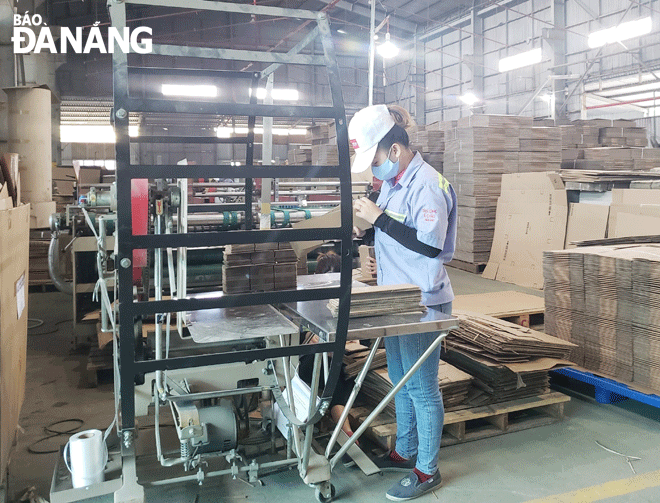 |
Developing a circular economy model is the orientation of the Da Nang branch of the Heineken Viet Nam Brewery Co., Ltd.
Mr. Nguyen Thanh Phuc, the General Director of the company, said that the factory uses 100% renewable energy in the entire brewing process instead of using diesel oil and strives to use 100% renewable energy by 2025 for all production activities. In the packaging stage, 100% of glass bottles are reused for more than 30 times, so the rate of reused glass bottles reaches 97%.
Plastic bottle storage crates are also designed to be reused as much as possible. For canned products, cardboard boxes and aluminum cans that are 100% recyclable are used by the company. In waste management stage, 99% of by-products are recycled and reused.
According to Mr. Phuc, the efficient use of energy is an important pillar in the sustainable development of enterprises, towards cleaner production.
Meanwhile, the Asia Architecture and Trading Co., Ltd based in the Hoa Khanh Industrial Park, Lien Chieu District, has been joining the project on implementing the initiative of eco-industrial parks towards a sustainable industrial park model in Viet Nam since 2016.
Mr. Ha Ngoc Thong, the Director of the company, informed that after applying many technological innovation solutions such as increasing the treatment capacity for the wastewater treatment system, and investing in pressing equipment and material conveying belts, the company saves a lot of costs of electricity, water, chemicals and waste.
For instance, with about 70 tonnes of finished papers, the company only generates an average of 1.5 tonnes of waste, mainly reusable tape.
These are two of many enterprises based in the Hoa Khanh Industrial Park participating in the criteria of resource efficient and cleaner production (RECP), thereby contributing to saving costs as well as improving the production environment.
Since 2015, the Hoa Khanh Industrial Park has been one of the first three industrial parks nationwide to pioneer in the project on implementing the initiative of eco-industrial parks towards a sustainable industrial park model in Viet Nam.
Since 2019, it has continued participating in phase 2 of the project on deploying eco-industrial parks according to the approach from the global eco-industrial park programme. The project is chaired by the Department of Economic Zones Management under the Ministry of Planning and Investment, and the United Nations Industrial Development Organisation.
Between 2016 and 2020, a total of 228 solutions were applied, estimated to help local businesses save more than VND14 billion/year, as well as reduce nearly 50,000m3 of wastewater and over 5,000 tonnes of carbon dioxide (CO2)/year.
The Management Board of the Da Nang Hi-Tech Park and Industrial Parks has coordinated with the Viet Nam Cleaner Production Centre to evaluate the potential for building an industrial symbiosis network in the Hoa Khanh Industrial Park.
Currently, the Hoa Khanh Industrial Park has a potential industrial symbiotic link between the city branch of the Heineken Viet Nam Brewery Co., Ltd and the Green Energy Production Investment JSC.
Comparing the criteria of eco-industrial parks according to the national government-issued Decree No. 35/2022/ND-CP dated May 28, 2022 regulating the management of industrial zones and economic zones, the Hoa Khanh Industrial Park still lacks 2 criteria: the ratio of enterprises applying RECP solutions is still low and the development and expansion of industrial symbiosis models is still limited.
Mr. Vu Quang Hung, Head of the Management Board of the Da Nang Hi-Tech Parks and Industrial Parks, pointed out some problems arising in the current ecological industrial park transformation, including the limited source of capital to support technological innovation and the complicated process, not really creating motivation for enterprises to renovate production technology.
Besides, most of waste circulation model in industrial parks are spontaneous and on a small scale. Therefore, more mechanisms and policies are needed to encourage enterprises to form industrial symbiotic links.
To support businesses, from July 20 - August 4, the management board received applications from businesses operating and doing business in the Hoa Khanh Industrial Park to support the assessment of resource efficiency and cleaner production.
In the coming time, the management board will continue to study the development policy of eco-industrial parks in some countries in the region to advise the municipal People's Committee to issue support policies for local enterprises to improve management and operation processes, innovate production technologies to reduce pollution sources, implement industrial symbiosis and transform into ecological industrial zones. Also, heed will be on building an information channel between green financial funds and businesses.




